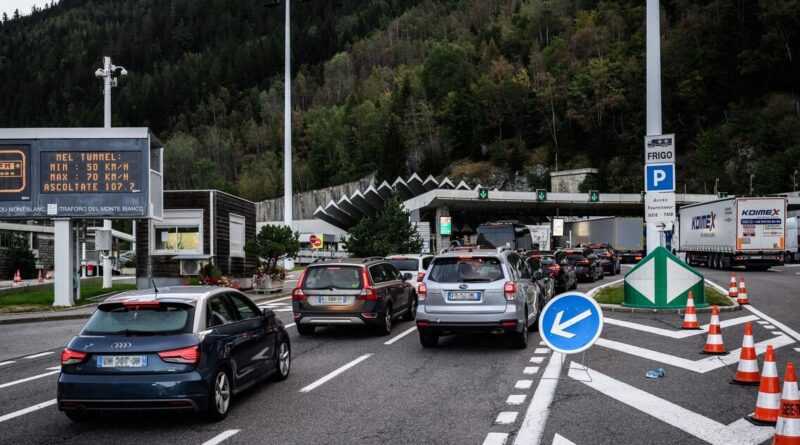Chaos as Mont Blanc Tunnel forced to close for 15 weeks | World | News
The huge Mont Blanc Tunnel, connecting France and Italy, will be shut for 15 weeks, starting next Monday and only reopening just before Christmas.
The mega-tunnel’s long closure – from September 2 to December 16 – could spell chaos for tourists and businesses alike.
More than 5,000 drivers pass through the Mont Blanc tunnel daily, travelling between Chamonix in Haute Savoie, southeast France, and Courmayeur in Aosta Valley, northwest Italy.
A 600-metre stretch (0.37 miles) of the tunnel is set to be completely reconstructed. However, since the machinery required cannot be removed and reinstalled every night, the works have forced the closure of the entire 11.2-kilometre (seven-mile) tunnel beneath the Alps.
It will be one of the first major European tunnels to undertake such deep renovation work on its structure.
The engineering wonder is the world’s second-deepest tunnel at 2,480 metres (8,140ft) beneath the surface, behind only the Gotthard Base Tunnel, which opened in 2016 in Switzerland.
The tunnel has undergone several renovations since it was opened in 1965. Renovations for the Mont Blanc Tunnel in 2002 cost €380m (£319m).
The current renovations will cost around €50m (£42m) and will be open in time to mark the tunnel’s 60th anniversary next year.
These latest renovations will install a new waterproofing system to address water infiltration, which is a major factor in the tunnel’s ageing.
The Mont Blanc tunnel is part of a huge north-south European route known as the E25, which runs from the Hook of Holland down to Palermo in Sicily.
The mega-tunnel reduced the driving time between France and Italy to just 10 minutes.
While the Mont Blanc tunnel is closed, many drivers will have to opt for the Fréjus Tunnel, around 160km farther south
The cost of the Fréjus Tunnel journey will prove to be cheaper for drivers, with a return toll costing €57 (£48) compared to €64.20 (£54) for the Mont Blanc tunnel.
Mont Blanc Tunnel officials have warned drivers to expect further disruptions in the years to come.
Tunnel authorities added that they chose the autumn months to close the route as this is historically the quietest period for traffic.
It comes after a hectic summer for the tunnel, which frequently saw chaotic traffic jams, particularly from holidaymakers returning to France from Italy.





